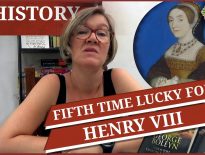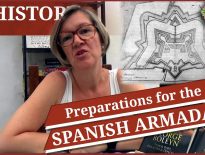On this day in Tudor history, 27th July 1588, Robert Dudley, Earl of Leicester, wrote to his queen with an invitation. He was intent on keeping the queen, the woman he loved, out of harm's way.
I explain all in today's "on this day in Tudor history" talk.
Also on this day in history:
- 1534 – Murder of John Alen, Archbishop of Dublin, in Artane. Alen, his chaplains and servants, were murdered by the men of Thomas Fitzgerald, Baron Offaly, after their ship ran aground near Clontarf and they were taken prisoner. He was buried in a pauper's grave.
- 1550 – Baptism of George Whetstone, writer, at St Lawrence, Old Jewry. His works included “The Rocke of Regarde”, “The Honorable Reputation of a Soldier”, “Heptameron of Civill Discourses” and the two-part play “ Promos and Cassandra”, which was a source for Shakespeare's “Measure to Measure”.
- 1553 – Edward VI's former tutor and principal secretary, Sir John Cheke, was sent to the Tower of London on 27/28th July for his part in putting Lady Jane Grey on the throne. He was released in spring 1554.
- 1578 – Death of Jane Lumley (née Fitzalan), Lady Lumley, translator, at Arundel Place in London. She was buried at St Clement Danes, the Strand, but later moved to a tomb in Cheam, Surrey. Jane is known as the first person to translate Euripides's “Iphigeneia at Aulis” into English, and she also translated various orations of Isocrates from Greek to Latin. Her work can be found in the British Library.
- 1593 – Execution of William Davies, Roman Catholic priest and martyr, at Beaumaris Castle on the Island of Anglesey. He was hanged, drawn and quartered. Davies was beatified in 1987 by Pope John Paul II.
- 1622 – Death of Thomas Knyvett, Baron Knyvett and Gentleman of the Bedchamber to Queen Elizabeth I and James I, at his home in King Street, Westminster. He was buried in Stanwell Church in Middlesex.



There is no way Elizabeth would have been on the front line. She hid in Richmond until it was over, going to address the troops on the day it was over. Sorry to sound sceptical but the rest of the sources show she didn’t care that there was no ammunition and she didn’t even pay them afterwards. She gave a great speech, nobody denies that, but fighting on the front line, no, playing with a monkey and showing signs of a loss of reality is more like it.
I noticed the reference to Blessed William Davies in the list and his execution at Beaumaris Castle. He was born near Ross on Sea, near Colwyn Bay and grew up there. He was protected by the local gentlemen and hid in Penryn Old Hall near the Little Orme in what is now Llandudno. He kept a printing press on the Little Orme in a cave and Mass was said up there. The first printed Book in the Welsh Language: Mirror of the Christian Soul was printed there in the cave. A copy is in the National Library of Wales on the internet. A tunnel led from the house to the cave but had to be bricked up when the modern road was built to the top of the Orme. There is a priest hole behind the fireplace in the hall, now a restaurant and three priests including Father Davies were hiding there. He was arrested in an armed assault on the cave in which the press was found but the Mass ornaments and two others escaped. You can only see the cave by boat unless you go right down to the cove and look high up on the cliff face. Unlike the much larger Great Orme the Little Orme is more treacherous to walk on and the paths are dangerous. You really need a guide and good walking geer and even ropes on some of them. Father Davies was taken to the Castle and then to Ludlow and other Castles. He was held for three years before he was executed. There is a beautiful memorial in the Catholic Church in Beaumaris to Father Davies and his fellow religious and relics belonging to the holy martyrs. Nearly every school in Llandudno and the Colwyn Bay area is dedicated to Saint William Dai or Davies.
When I found about him there I had to go on a search for him and information and put this together from various sources and visiting the site of the hall and the church and castle as well as local archives and museum which gave me a lot of information. I met a local historian who showed me around the hall, the barons hall, not open to the public, from the twelfth to the fourteenth century, the hiding place and showed me original documents and an alter from the time, converted to a seventeenth century piece of furniture and the door to the original tunnel. He knew all about Father Davies and the others. Seeing the place of the execution and the memorial in the Church on a later visit was very moving.
I go on adventures of my own making on holiday. This was one walk and bus trip and experience well worth the effort.
Cheers RTL
There was obviously concern that she was actually going to travel to the coast to meet the Duke of Parma’s forces. Her council were very worried.
I know Llandudno and Colwyn Bay very well. Lots of days out to them and also Rhyl when I was a child. A beautiful part of the world. It is wonderful to be able to visit places where historic events took place, it’s a real connection. Fabulous!
It’s one of our regular escapes, especially for a late Summer or autumn break. We go to the same hotel, usually the end of October and have fantastic weather. The open top bus into Conway and the Conway Valley Railway are two regular pastimes and as many castles as possible. Love the place. Monmouthshire is fantastic too. Spent one Summer on the Gower Peninsula, but I really want to go to Pembrokeshire for our next Welsh adventures. The history and romance of Wales is beyond compare.
Yes, Wales is amazing, I love visiting my parents there and every holiday when I was a child we would visit both sets of grandparents, one set in North Wales and the other set just over the border in Cheshire. There is so much to see. I’d like to go back to Pembrokeshire too.